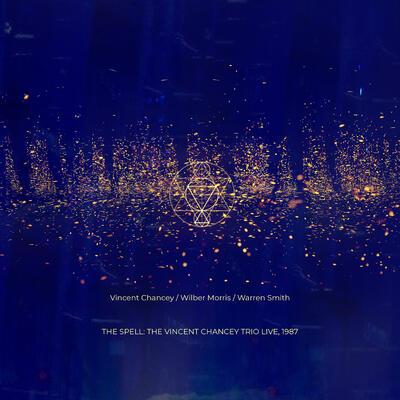Featuring:
Vincent Chancey - french horn
Wilber Morris - bass
Warren Smith - drums
Side A
CHAZZ (Wilber Morris)
THE SPELL (Vincent Chancey)
Side B
FREE FORM #10 (Warren Smith)
AFRO-AMERIN (Wilber Morris)
Daniel Barbiero - Avant Music News
A trio led by French hornist Vincent Chancey and including the late double bassist Wilber Morris and the percussionist Warren Smith. All three musicians are or were highly accomplished practitioners of the art; Chancey, whose name may be less familiar to many, spent the mid 1970s in Sun Ra’s Arkestra and the 1980s in Lester Bowie’s Brass Fantasy and the David Murray Big Band. The Spell is an archival recording made in the Kraine Art Gallery in New York City in October of 1987; the sound quality is somewhat raw and the audio field shallow–as one might reasonably expect from the on-the-spot technology of the time–but the performances come through clearly and eloquently. Chancey takes an unlikely candidate for lead instrument in a jazz setting and plays it nimbly; Morris and Smith respond with both power and subtlety. The group’s sui generis makeup lends the collective sound a warm, wine-dark quality which is only emphasized when the keys turn minor, as they do in the first piece, a composition by Morris. What keeps the music from being confined to a narrow range of timbres is Morris’ moving back and forth between arco and pizzicato and Smith’s use of mallet percussion. The subtle framing effect this has on Chancey’s horn comes out particularly well on the fourth track, another Morris composition, where first double bass and then mallet percussion play in unison with the horn. The Spell is a rewarding album and another example of No Business’ making available historic performances that otherwise would undeservedly be forgotten.
Stuart Broomer - New York City Jazz Record
Vincent Chancey is a distinguished member of the small fraternity of French horn players in jazz, heir to pioneers like Julius Watkins and Willie Ruff. A student of the former, Chancey has been active since the mid ‘70s, contributing to the major large ensembles and brass choirs of the era, including those of Sun Ra, Carla Bley, Charlie Haden, David Murray, Muhal Richard Abrams, Lester Bowie and Dave Douglas. He has also released three CDs as a leader since 1993. This vinyl release, recorded at the Kraine Art Gallery in New York, predates his studio dates as a leader by six years and presents Chancey with superb support from the late bassist Wilber Morris and percussionist Warren Smith, the latter providing further melodic input with a mallet instrument, likely xylophone. Why French horn? It takes only a few bars of Morris’ blues-drenched “Chazz” to provide an answer. Chancey has the sound of a warmer, lighter trombone, enhanced by the instant precision of keys, along with the horn’s ingrained capacity for split tones and centuries-old techniques of hand-damping to develop subtle, expressive inflections. “Chazz” feels as old as the oldest blues and gospel, with Morris and Smith, ideal foundational players, providing bass pedal tones and drums that are propulsive at near-dirge tempo. When Morris comes to the fore, he does so with the resonant force and precision of Charles Mingus (a David Murray recording of the composition is explicitly dedicated). That slightly subdued feel continues with Chancey’s own title track, his magisterial lyricism enhanced by elastic bass arco glissandi and bright xylophone, but the mood shifts for Smith’s “Free Form #10” to a more energized approach, though oddly with a Mingus-like vamp in the works. The final track, Morris’ “Afro-Amerin”, contrasts with “Chazz”: a complex piece with textures ranging from harsh bowed bass and abstract xylophone to sometimes burbling, dramatic runs from French horn. Overall, it’s a strongly engaged session, a window in time to a distinctive trio that combines elegiac depth and close-knit immediacy.
